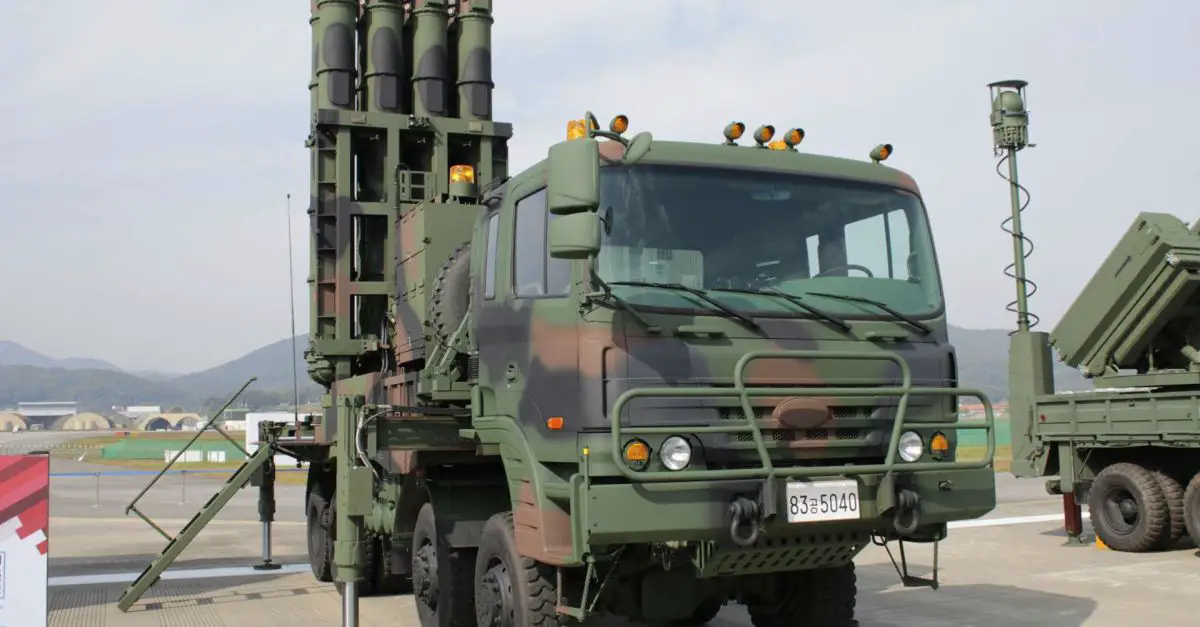Breaking news
Iraq Requests 8 M-SAM-II Air Defense Missile System Batteries from Korea in $2.56 Billion Deal.
Underlining the pressing need for advanced missile defense systems in the Middle East, Iraq has urgently sought eight batteries of the M-SAM-II air and ballistic missile defense system from South Korea. This significant request, valued at approximately $2.56 billion, was made public on June 1, 2024, through a Tweet by @mason_8718.
Follow Army Recognition on Google News at this link

A TEL Transporter Erector Launcher truck of M-SAM-II battery was displayed during the South Korean AirShow in Seoul in September 2023. (Picture source: Army Recognition Group)
The M-SAM-II, also known as Cheongung II, is celebrated for its advanced capabilities and reliability in modern combat scenarios. Developed by the Agency for Defense Development (ADD) and manufactured by LIG Nex1, the M-SAM-II offers robust defense against various aerial threats, including aircraft, cruise missiles, and ballistic missiles. One of its standout features is its advanced radar system, which can simultaneously detect and track multiple targets. This multi-function radar ensures high target identification and engagement accuracy, making the M-SAM-II a formidable defense asset.
Additionally, the M-SAM-II employs hit-to-kill technology in its interceptor missiles, designed to neutralize incoming threats through kinetic energy. This technology significantly enhances the probability of a successful interception while minimizing the risk of collateral damage.
The M-SAM-II has emerged as one of the most sought-after surface-to-air missile systems on the global stage. Recent contracts, including a $3.2 billion deal with Saudi Arabia and a $3.5 billion contract with the United Arab Emirates, attest to its popularity. Coupled with Iraq's recent request, these contracts amount to a staggering $9.2 billion within just one to two years, solidifying the M-SAM-II's position as Korea's most successful defense product alongside the K9 artillery system.
Furthermore, South Korea is advancing its missile defense capabilities by developing the M-SAM-III, a dedicated medium-range hypersonic missile interceptor system, and the L-SAM-II, a high-altitude, long-range hypersonic missile interceptor system. LIG Nex1, the manufacturer of the M-SAM-II, is also actively participating in air defense system acquisition programs in Malaysia and Romania, indicating its expanding footprint in the global defense market.
Playing a pivotal role in the region's defense dynamics, Saudi Arabia and the United Arab Emirates (UAE) have significantly bolstered Iraq's defense infrastructure through military equipment and strategic cooperation. Both nations are enhancing their geopolitical influence in the region by leveraging their substantial military budgets and advanced defense industries.
Saudi Arabia, for instance, has been focused on strengthening its defense ties with Iraq as part of broader regional security efforts. This involves providing military equipment and engaging in joint military exercises and training programs aimed at improving the interoperability and effectiveness of Iraqi forces. Saudi Arabia's significant investment in modernizing its military capabilities, including advanced air defense systems and armored vehicles, positions it as a key player in bolstering Iraq's defense infrastructure.
Conversely, the UAE has been active in supporting Iraq through various military and security initiatives. The UAE's defense strategy includes supplying advanced weaponry and technology to allied countries, including Iraq. This support is part of a larger effort to counter regional threats and ensure stability. The UAE has also trained Iraqi military personnel, enhancing their operational capabilities and readiness.
Saudi Arabia and the UAE's involvement in Iraq reflects their broader defense strategies, including developing indigenous defense industries to reduce reliance on Western arms suppliers. Saudi Arabia's Vision 2030 and the UAE's defense initiatives focus on building domestic production capabilities for military equipment, which could further increase their capacity to support Iraq and other regional allies with advanced military technologies in the future.
Undoubtedly, Saudi Arabia's and the UAE's strategic military support for Iraq is a pivotal component of their efforts to maintain regional security and counterbalance influences from neighboring powers. This collaboration not only strengthens Iraq's defense capabilities but also reinforces Saudi Arabia and the UAE's geopolitical standing in the Middle East, underscoring the strategic importance of their actions.


























